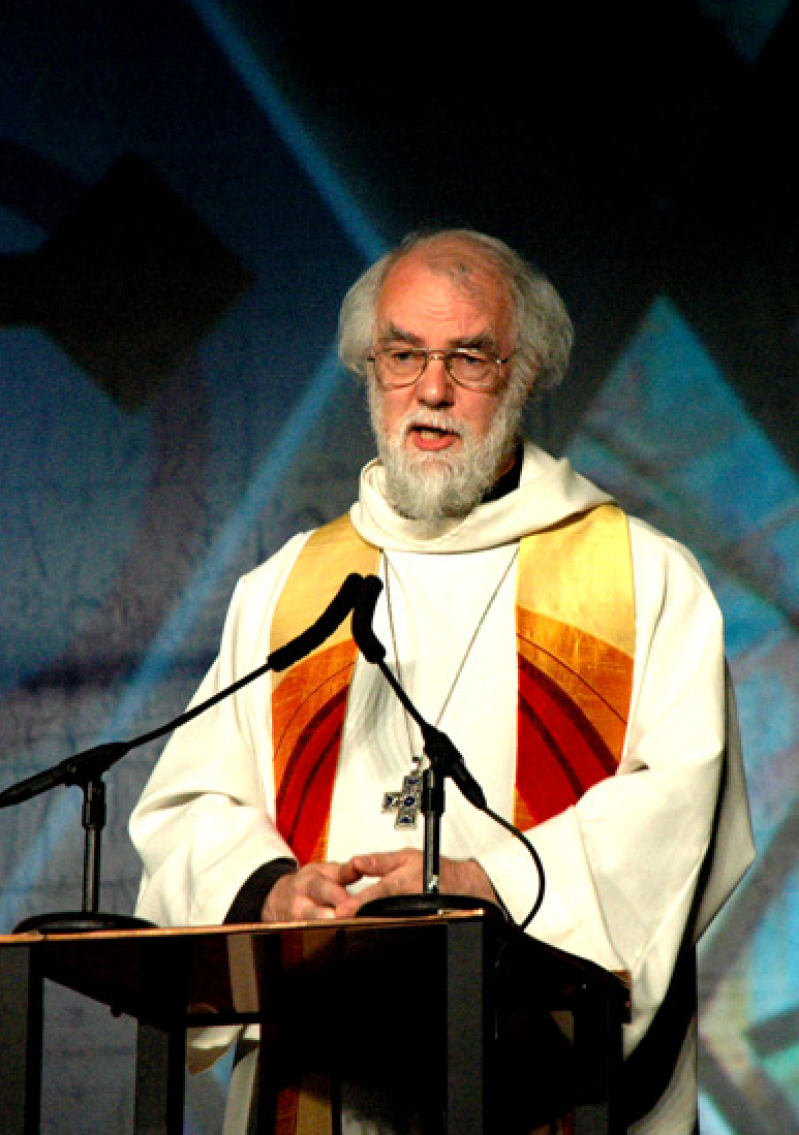
The head of the Anglican Communion suggested Thursday that tensions stemming from concerns within the worldwide church body are partly the result of its' members love and need for each other.
“If we – if I – had felt that we could do perfectly well without you, there wouldn't be a problem,” the Archbishop of Canterbury, the Most Rev. Rowan Williams, told The Episcopal Church’s 76th General Convention in Anaheim, Calif.
“But the bonds of relationship are deep, for me personally as for many others. And I'm tempted to adapt what St Paul says to the Corinthians in the middle of a set of tensions no less bitter than what we have been living through and in the wake of challenges from St Paul a good deal more savage than even the sharpest words from Primates or Councils: 'Why? Because we do not love you? God knows we do.'”
Since The Episcopal Church’s election of its first openly gay bishop in 2003, relations between the U.S. arm of Anglicanism and the rest of the worldwide Anglican Communion have been strained to the point of tearing.
While adherents of the Christian faith have historically taught that homosexuality is a sin according to Scripture, liberal believers say biblical teachings on inclusiveness should take precedence and nullify any such teachings against homosexuality.
Conservative Christians, meanwhile, hold onto the belief that homosexuals should not be allowed to hold positions of leadership within the Church. They also feel that the Church should not bless homosexual relationships, as this would be tantamount to blessing a sinful act.
In his meditation Sunday, Williams confessed that he was filled with both hopes and anxieties in coming to this year’s General Convention.
Episcopal leaders at this year's convention, which takes place every three years, will be considering a number of resolutions that center around the hotly debated issue of homosexuality.
One new resolution that will be introduced and debated at this year’s General Convention seeks to extend a key marriage ritual to gay and lesbian couples. Another calls on the General Convention to amend references in The Episcopal Church's canon laws on marriage from "a man and a woman" to "two adults."
Perhaps the most critical of petitions are those seeking to repeal or retract B033, a resolution passed in 2006 that calls for restraint in ordaining bishops "whose manner of life presents a challenge to the wider church" – mainly noncelibate homosexuals.
Ahead of this month’s convention, Anglican leaders overseas have warned The Episcopal Church against rescinding resolution B033 or passing any resolution that would further put the American church body at odds with the larger Anglican Church.
The Most Rev. Drexel Gomez, the Archbishop of the West Indies and chairman of the Covenant Working Group, said in May that if the General Convention rescinds resolution B033 and removes any barriers to persons involved in same-sex relationships, it will "imperil" the work of the Covenant and will have an impact on the rest of the communion because of the responses others will need to make.
Similarly, Williams on Thursday said that he hopes and prays that there won't be decisions in the coming days that could push Anglicans further apart.
“But if people elsewhere in the Communion are concerned about this, it's because of a profound sense of what the Episcopal Church has given and can give to our fellowship worldwide,” he clarified, listing William Stringfellow, the “greatest Episcopalian theologian and perhaps the greatest American theologian of the twentieth century,” as one of a number of gifts that have come out from The Episcopal Church.
“[W]e are already bound to each other, and our life is invested in each other, in those we see and those we don't, those we like and those we don't,” Williams added.
Earlier in his address, the Anglican leader acknowledged that it has been hard for Anglicans from all sides of the debates and said honestly that he suspects it "will not get much easier."
Still, Williams said he was thankful for The Episcopal Church's willingness to engage with the wider life of the Communion.
“May this gathering be a sign of life in the face of death, a declaration of who we are in Jesus and with one another, in the heart of God the Holy Trinity: chosen friends who, miraculously, know something of that God's longing for what has been made,” he concluded.
The 87th General Convention is scheduled to end next Friday, July 17.







